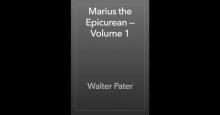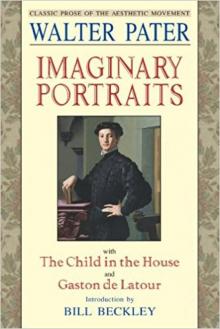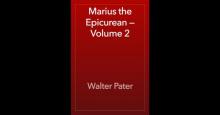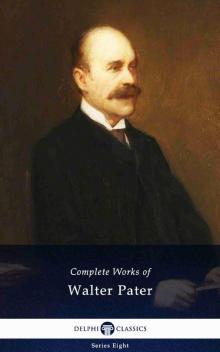- Home
- Walter Pater
Imaginary Portraits Page 3
Imaginary Portraits Read online
Page 3
enjoyments of the life he now leads among the wealthy andrefined, and that bald existence of theirs in his old home? A life,agitated, exigent, unsatisfying! That is what this letter reallydiscloses, below so attractive a surface. As his gift expands so doesthat incurable restlessness one supposed but the humour natural to apromising youth who had still everything to do. And now the onlyrealised enjoyment he has of all this might seem to be the thought ofthe independence it has purchased him, so that he can escape from onelodging-place to another, just as it may please him. He has alreadydeserted, somewhat incontinently, more than one of those [19] finehouses, the liberal air of which he used so greatly to affect, andwhich have so readily received him. Has he failed truly to grasp thefact of his great success and the rewards that lie before him? At allevents, he seems, after all, not greatly to value that dainty world heis now privileged to enter, and has certainly but little relish for hisown works--those works which I for one so thirst to see.
March 1714.
We were all--Jean-Philippe, Michelle Watteau, and ourselves--half inexpectation of a visit from Antony; and to-day, quite suddenly, he iswith us. I was lingering after early Mass this morning in the churchof Saint Vaast. It is good for me to be there. Our people lie underone of the great marble slabs before the jube, some of the memorialbrass balusters of which are engraved with their names and the dates oftheir decease. The settle of carved oak which runs all round the widenave is my father's own work. The quiet spaciousness of the place isitself like a meditation, an "act of recollection," and clears away theconfusions of the heart. I suppose the heavy droning of the carillonhad smothered the sound of his footsteps, for on my turning round, whenI supposed myself alone, Antony Watteau was standing near me. Constantobserver as he is of the lights and shadows of things, he visits [20]places of this kind at odd times. He has left Jean-Baptiste at work inParis, and will stay this time with the old people, not at our house;though he has spent the better part of to-day in my father's workroom.He hasn't yet put off, in spite of all his late intercourse with thegreat world, his distant and preoccupied manner--a manner, it is true,the same to every one. It is certainly not through pride in hissuccess, as some might fancy, for he was thus always. It is rather asif, with all that success, life and its daily social routine weresomewhat of a burden to him.
April 1714.
At last we shall understand something of that new style of his--theWatteau style--so much relished by the fine people at Paris. He hastaken it into his kind head to paint and decorate our chief salon--theroom with the three long windows, which occupies the first floor of thehouse.
The room was a landmark, as we used to think, an inviolable milestoneand landmark, of old Valenciennes fashion--that sombre style, indulgingmuch in contrasts of black or deep brown with white, which theSpaniards left behind them here. Doubtless their eyes had found itsshadows cool and pleasant, when they shut themselves in from thecutting sunshine of their own country. But in our country, [21] wherewe must needs economise not the shade but the sun, its grandiosityweighs a little on one's spirits. Well! the rough plaster we used tocover as well as might be with morsels of old figured arras-work, isreplaced by dainty panelling of wood, with mimic columns, and a quiteaerial scrollwork around sunken spaces of a pale-rose stuff and certainoval openings--two over the doors, opening on each side of the greatcouch which faces the windows, one over the chimney-piece, and oneabove the buffet which forms its vis-a-vis--four spaces in all, to befilled by and by with "fantasies" of the Four Seasons, painted by hisown hand. He will send us from Paris arm-chairs of a new pattern hehas devised, suitably covered, and a painted clavecin. Our old silvercandlesticks look well on the chimney-piece. Odd, faint-colouredflowers fill coquettishly the little empty spaces here and there, likeghosts of nosegays left by visitors long ago, which paled thus,sympathetically, at the decease of their old owners; for, in spite ofits new-fashionedness, all this array is really less like a new thingthan the last surviving result of all the more lightsome adornments ofpast times. Only, the very walls seem to cry out:--No! to makedelicate insinuation, for a music, a conversation, nimbler than any wehave known, or are likely to find here. For himself, he converseswell, but very sparingly. He assures us, indeed, that the [22] "newstyle" is in truth a thing of old days, of his own old days here inValenciennes, when, working long hours as a mason's boy, he in fancyreclothed the walls of this or that house he was employed in, with thisfairy arrangement--itself like a piece of "chamber-music," methinks,part answering to part; while no too trenchant note is allowed to breakthrough the delicate harmony of white and pale red and little goldentouches. Yet it is all very comfortable also, it must be confessed;with an elegant open place for the fire, instead of the big old stoveof brown tiles. The ancient, heavy furniture of our grandparents goesup, with difficulty, into the garrets, much against my father'sinclination. To reconcile him to the change, Antony is painting hisportrait in a vast perruque, and with more vigorous massing of lightand shadow than he is wont to permit himself.
June 1714.
He has completed the ovals:--The Four Seasons. Oh! the summerlikegrace, the freedom and softness, of the "Summer"--a hayfield such as wevisited to-day, but boundless, and with touches of level Italianarchitecture in the hot, white, elusive distance, and wreaths offlowers, fairy hayrakes and the like, suspended from tree to tree, withthat wonderful lightness which is one of the charms of his [23] work.I can understand through this, at last, what it is he enjoys, what heselects by preference, from all that various world we pass our livesin. I am struck by the purity of the room he has re-fashioned forus--a sort of moral purity; yet, in the forms and colours of things.Is the actual life of Paris, to which he will soon return, equallypure, that it relishes this kind of thing so strongly? Only, methinks'tis a pity to incorporate so much of his work, of himself, withobjects of use, which must perish by use, or disappear, like our ownold furniture, with mere change of fashion.
July 1714.
On the last day of Antony Watteau's visit we made a party to Cambrai.We entered the cathedral church: it was the hour of Vespers, and ithappened that Monseigneur le Prince de Cambrai, the author ofTelemaque, was in his place in the choir. He appears to be of greatage, assists but rarely at the offices of religion, and is never to beseen in Paris; and Antony had much desired to behold him. Certainly itwas worth while to have come so far only to see him, and hear him givehis pontifical blessing, in a voice feeble but of infinite sweetness,and with an inexpressibly graceful movement of the hands. A veritablegrand seigneur! His refined old age, the impress of genius and [24]honours, even his disappointments, concur with natural graces to makehim seem too distinguished (a fitter word fails me) for this world.Omnia vanitas! he seems to say, yet with a profound resignation, whichmakes the things we are most of us so fondly occupied with look pettyenough. Omnia vanitas! Is that indeed the proper comment on ourlives, coming, as it does in this case, from one who might have madehis own all that life has to bestow? Yet he was never to be seen atcourt, and has lived here almost as an exile. Was our "Great KingLewis" jealous of a true grand seigneur or grand monarque by naturalgift and the favour of heaven, that he could not endure his presence?
July 1714.
My own portrait remains unfinished at his sudden departure. I sat forit in a walking-dress, made under his direction--a gown of a peculiarsilken stuff, falling into an abundance of small folds, giving me "acertain air of piquancy" which pleases him, but is far enough from mytrue self. My old Flemish faille, which I shall always wear, suits mebetter.
I notice that our good-hearted but sometimes difficult friend saidlittle of our brother Jean-Baptiste, though he knows us so anxious onhis account--spoke only of his constant industry, [25] cautiously, andnot altogether with satisfaction, as if the sight of it wearied him.
September 1714.
Will Antony ever accomplish that long-pondered journey to Italy? Forhis own sake, I should be glad he might. Yet it seems desolately far,across those great hills
and plains. I remember how I formed a planfor providing him with a sum sufficient for the purpose. But that heno longer needs.
With myself, how to get through time becomes sometimes thequestion,--unavoidably; though it strikes me as a thing unspeakably sadin a life so short as ours. The sullenness of a long wet day isyielding just now to an outburst of watery sunset, which strikes fromthe far horizon of this quiet world of ours, over fields andwillow-woods, upon the shifty weather-vanes and long-pointed windows ofthe tower on the square--from which the Angelus is sounding--with amomentary promise of a fine night. I prefer the Salut at Saint Vaast.The walk thither is a longer one, and I have a fancy always that I maymeet Antony Watteau there again, any time; just as, when a child,having found one day a tiny box in the shape of a silver coin, for longafterwards I used to try every piece of money that came into my hands,expecting it to open.
[26]
September 1714.
We were sitting in the Watteau chamber for the coolness, this sultryevening. A sudden gust of wind ruffed the lights in the sconces on thewalls: the distant rumblings, which had continued all the afternoon,broke out at last; and through the driving rain, a coach, rattlingacross the Place, stops at our door: in a moment Jean-Baptiste is withus once again; but with bitter tears in his eyes;--dismissed!
October 1714.
Jean-Baptiste! he too, rejected by Antony! It makes our friendship andfraternal sympathy closer. And still as he labours, not lesssedulously than of old, and still so full of loyalty to his old master,in that Watteau chamber, I seem to see Antony himself, of whomJean-Baptiste dares not yet speak,--to come very near his work, andunderstand his great parts. So Jean-Baptiste's work, in its nearnessto his, may stand, for the future, as the central interest of my life.I bury myself in that.
February 1715.
If I understand anything of these matters, Antony Watteau paints thatdelicate life of Paris so excellently, with so much spirit, partly [27]because, after all, he looks down upon it or despises it. To persuademyself of that, is my womanly satisfaction for his preference--hisapparent preference--for a world so different from mine. Thosecoquetries, those vain and perishable graces, can be rendered soperfectly, only through an intimate understanding of them. For him, tounderstand must be to despise them; while (I think I know why) henevertheless undergoes their fascination. Hence that discontent withhimself, which keeps pace with his fame. It would have been better forhim--he would have enjoyed a purer and more real happiness--had heremained here, obscure; as it might have been better for me!
It is altogether different with Jean-Baptiste. He approaches thatlife, and all its pretty nothingness, from a level no higher than itsown; and beginning just where Antony Watteau leaves off in disdain,produces a solid and veritable likeness of it and of its ways.
March 1715.
There are points in his painting (I apprehend this through his ownpersistently modest observations) at which he works out his purposemore excellently than Watteau; of whom he has trusted himself to speakat last, with a wonderful self-effacement, pointing out in each of hispictures, for the rest so just and true, how [28] Antony would havemanaged this or that, and, with what an easy superiority, have done thething better--done the impossible.
February 1716.
There are good things, attractive things, in life, meant for one andnot for another--not meant perhaps for me; as there are pretty clotheswhich are not suitable for every one. I find a certain immobility ofdisposition in me, to quicken or interfere with which is like physicalpain. He, so brilliant, petulant, mobile! I am better far besideJean-Baptiste--in contact with his quiet, even labour, and manner ofbeing. At first he did the work to which he had set himself, sullenly;but the mechanical labour of it has cleared his mind and temper atlast, as a sullen day turns quite clear and fine by imperceptiblechange. With the earliest dawn he enters his workroom, the Watteauchamber, where he remains at work all day. The dark evenings he spendsin industrious preparation with the crayon for the pictures he is tofinish during the hours of daylight. His toil is also his amusement:he goes but rarely into the society whose manners he has to re-produce.The animals in his pictures, pet animals, are mere toys: he knows it.But he finishes a large number of works, door-heads, clavecin cases,and the like. His happiest, his most genial moments, [29] he puts,like savings of fine gold, into one particular picture (true opusmagnum, as he hopes), The Swing. He has the secret of surprisingeffects with a certain pearl-grey silken stuff of his predilection; andit must be confessed that he paints hands--which a draughtsman, ofcourse, should understand at least twice as well as all otherpeople--with surpassing expression.
March 1716.
Is it the depressing result of this labour, of a too exacting labour?I know not. But at times (it is his one melancholy!) he expresses astrange apprehension of poverty, of penury and mean surroundings in oldage; reminding me of that childish disposition to hoard, which Inoticed in him of old. And then--inglorious Watteau, as he is!--attimes that steadiness, in which he is so great a contrast to Antony, asit were accumulates, changes, into a ray of genius, a grace, aninexplicable touch of truth, in which all his heaviness leaves him fora while, and he actually goes beyond the master; as himself protests tome, yet modestly. And still, it is precisely at those moments that hefeels most the difference between himself and Antony Watteau. "In thatcountry, all the pebbles are golden nuggets," he says; with perfectgood-humour.
[30]
June 1716.
'Tis truly in a delightful abode that Antony Watteau is just nowlodged--the hotel, or town-house of M. de Crozat, which is not only acomfortable dwelling-place, but also a precious museum lucky people gofar to see. Jean-Baptiste, too, has seen the place, and describes it.The antiquities, beautiful curiosities of all sorts--above all, theoriginal drawings of those old masters Antony so greatly admires--arearranged all around one there, that the influence, the genius, of thosethings may imperceptibly play upon and enter into one, and form whatone does. The house is situated near the Rue Richelieu, but has alarge garden about it. M. de Crozat gives his musical parties there,and Antony Watteau has painted the walls of one of the apartments withthe Four Seasons, after the manner of ours, but doubtless improved bysecond thoughts. This beautiful place is now Antony's home for awhile. The house has but one story, with attics in the mansard roofs,like those of a farmhouse in the country. I fancy Antony fled thitherfor a few moments, from the visitors who weary him; breathing thefreshness of that dewy garden in the very midst of Paris. As for me, Isuffocate this summer afternoon in this pretty Watteau chamber of ours,where Jean-Baptiste is at work so contentedly.
[31]
May 1717.
In spite of all that happened, Jean-Baptiste has been looking forwardto a visit to Valenciennes which Antony Watteau had proposed to make.He hopes always--has a patient hope--that Anthony's former patronage ofhim may be revived. And now he is among us, actually at hiswork--restless and disquieting, meagre, like a woman with some nervousmalady. Is it pity, then, pity only, one must feel for the brilliantone? He has been criticising the work of Jean-Baptiste, who takes hisjudgments generously, gratefully. Can it be that, after all, hedespises and is no true lover of his own art, and is but chilled by anenthusiasm for it in another, such as that of Jean-Baptiste? as ifJean-Baptiste over-valued it, or as if some ignobleness or blunder,some sign that he has really missed his aim, started into sight fromhis work at the sound of praise--as if such praise could hardly bealtogether sincere.
June 1717.
And at last one has actual sight of his work--what it is. He hasbrought with him certain long-cherished designs to finish here inquiet, as he protests he has never finished before. That charmingNoblesse--can it be really so distinguished to the minutest point, sonaturally [32] aristocratic? Half in masquerade, playing thedrawing-room or garden comedy of life, these persons have upon them,not less than the landscape he composes, and among the accidents ofwhich they group themselves with such a perfect fitting
ness, a certainlight we should seek for in vain upon anything real. For theirframework they have around them a veritable architecture--atree-architecture--to which those moss-grown balusters; termes,statues, fountains, are really but accessories. Only, as I gaze uponthose windless afternoons, I find myself always saying to myselfinvoluntarily, "The evening will be a wet one." The storm is alwaysbrooding through the massy splendour of the trees, above thosesun-dried glades or lawns, where delicate children may be trustedthinly clad; and the secular trees themselves will hardly outlastanother generation.
July 1717.
There has been an exhibition of his pictures in the Hall of the Academyof Saint Luke; and all the world has been to see.
Yes! Besides that unreal, imaginary light upon these scenes, thesepersons, which is pure gift of his, there was a light, a poetry, inthose persons and things themselves, close at hand we had not seen. Hehas enabled us to see it: we are so much the better-off thereby, and I,for [33] one, the better. The world he sets before us so engaginglyhas its care for purity, its cleanly preferences, in what one is tosee--in the outsides of things--and there is something, a sign, amemento, at the least, of what makes life really valuable, even inthat. There, is my simple notion, wholly womanly perhaps, but which Imay hold by, of the purpose of the arts.
August 1717.
And yet! (to read my mind, my experience, in somewhat different terms)methinks Antony Watteau reproduces that gallant world, those patchedand powdered ladies and fine cavaliers, so much to its ownsatisfaction, partly because he despises it; if this be a possiblecondition of excellent artistic production. People talk of a new eranow dawning upon the world, of fraternity, liberty, humanity, of anovel sort of social freedom in which men's natural goodness of heartwill blossom at a thousand points hitherto repressed, of warsdisappearing from the world in an infinite, benevolent ease

 Marius the Epicurean — Volume 1
Marius the Epicurean — Volume 1 Imaginary Portraits
Imaginary Portraits Marius the Epicurean — Volume 2
Marius the Epicurean — Volume 2 Delphi Complete Works of Walter Pater
Delphi Complete Works of Walter Pater